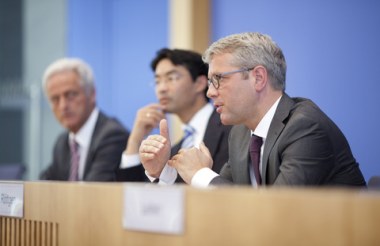UPDATED AND CORRECTED 7 June 2011 - this story has been updated to included Vattenfall's comments. An error suggesting that EOn owned Biblis B has been corrected.
Three of Germany's operating nuclear reactors will close before the end of the decade under draft legislation which firms up the arrangements leading to a phaseout of nuclear power.
 |
Environment minister Norbert Röttgen announces the draft law (Image: BMU/Thomas Trutschel) |
The amendments to the country's Atomic Energy Act, which have now been approved by the German cabinet, establish the basis for Germany's recently announced decision to close all of its nuclear power plants by 2022. Confirming earlier government announcements, the seven nuclear units which were ordered to shut down just days after the Fukushima accident in Japan plus the Krummel plant, which was already in a long-term shutdown at the time, will not restart. Their authorisation to operate will cease when the amended act enters into force.
Three out of six units which were last week earmarked for closure by 2021 will shut down well in advance of that date. Grafenrheinfeld will be first, in 2015, followed by Gundremmingen B in 2017 and Philippsburg 2 in 2019. Grohnde, Gundremmingen C and Brokdorf will close in 2021. The last three plants – Isar 2, Emsland and Neckarwestheim 2 – are Germany's most modern, and will all close in 2022.
It was only in September 2010 that Chancellor Angela Merkel announced policy changes that would enable Germany's nuclear power plants to operate beyond the average age limit of 34 years imposed by a Social Democratic Party and Green Party coalition government in 2001. Then Japan's Fukushima Daiichi nuclear power plant was struck by the earthquake and tsunami of 11 March 2011, and the German government announced that the country's seven oldest operating reactors would be shut down immediately during a three-month moratorium while Germany reconsidered its nuclear power plans. Last week, Merkel announced that those seven reactors - plus Krummel - would not restart and that Germany would phase out nuclear power completely by 2022.
According to the amendments to the law, one of the shutdown nuclear plants could be kept in reserve up to the spring of 2013, although it would only be used if 'conventional' power plants are not available to ensure security and stability of electricity supply over the winter months. In the longer term, Germany expects to make up the shortfall from the loss of its nuclear capacity by using renewables.
Compensation
Two of EOn's German units - Isar 1 and Unterweser - were among the seven forced to shut down in March. Following the government's announcement of the 2022 phaseout, the company said it accepted "the will of the political majority to secure an early phase-out of nuclear energy." However, it also warned that it would expect to receive "due compensation" for financial damages expected to amount to billions of euros and would be entering talks with the German government in an effort to avoid a legal dispute.
Vattenfall CEO Øystein Løseth echoed EOn's sentiments. In a press release dated 7 June noting Vattenfall's respect for the German decision, he also said that the company expected fair treatment and compensation for financial losses arising from it. Vattenfall has invested around €700 million ($1.025 billion) in the Krümmel and Brunsbüttel plants in recent years and says this must be taken into consideration for compensation and also the possible transfer of production rights between plants. "The Krümmel power plant cannot be treated worse than any other new reactor regarding time and amounts of the residual energy quota transfer," Løseth said.
Researched and written
by World Nuclear News




_66891.jpg)
_30199.jpg)
_72306.jpg)






